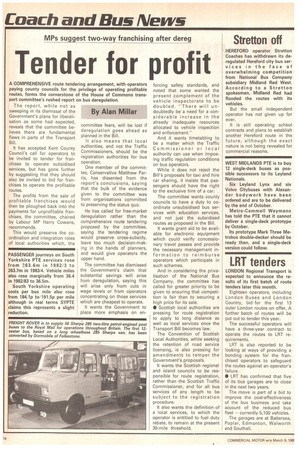Tender for profit
Page 20

If you've noticed an error in this article please click here to report it so we can fix it.
By Alan Millar
A COMPREHENSIVE route tendering arrangement, with operators paying county councils for the privilege of operating profitable routes, forms the cornerstone of the House of Commons transport committee's rushed report on bus deregulation.
The report, while not as sweeping in its dismissal of the Government's plans for liberalisation as some had expected, reveals that the committee believes there are fundamental flaws in parts of the Transport Bill.
It has accepted Kent County Council's call for operators to be invited to tender for franchises to operate subsidised services, but has gone further by suggesting that they should also be invited to bid for franchises to operate the profitable routes.
The profits from the sale of profitable franchises would then be ploughed back into the payments for unprofitable franchises, the committee, chaired by Labour MP Harry Cowans, recommends.
This would preserve the coordination and integration roles of local authorities which, the committee fears, will be lost if deregulation goes ahead as planned in the Bill.
It also means that local authorities, and not the Traffic Commissioners, should be the registration authorities for bus operation.
One member of the committee, Conservative Matthew Parris, has dissented from the report's conclusions, saying that the bulk of the evidence given to the committee was from organisations committed to preserving the status quo.
He has called for free-market deregulation rather than the comprehensive route tendering proposed by the committee, saying the tendering regime would preserve cross-subsidy, leave too much decision-making in the hands of planners, and would give operators the upper hand.
The committee has dismissed the Government's claim that substantial savings will arise from deregulation, saying this will arise only from cuts in wage levels or from operators concentrating on those services which are cheapest to operate.
It wants the Government to place more emphasis on en forcing safety standards, and noted that some wanted the present complement of the vehicle inspectorate to be doubled. "There will undoubtedly be a need for a considerable increase in the already inadequate resources allocated to vehicle inspection and enforcement."
And it wants timetabling to be a matter which the Traffic Commissioner or local authority can use when imposing traffic regulation conditions on bus operators.
While it does not reject the Bill's proposals for taxi and hire car sharing, it insists that passengers should have the right to the exclusive hire of a car.
The committee wants county councils to have a duty to coordinate unsubsidised bus services with education services, and not just the subsidised routes as proposed in the Bill.
It wants grant aid to be available for electronic equipment which could verify concessionary travel passes and provide the necessary management information to reimburse operators which participate in such schemes.
And in considering the privatisation of the National Bus Company, the committee has called for greater priority to be given to ensuring that competition is fair than to securing a high price for its sale.
• Scottish local authorities are pressing for route registration to apply to long distance as well as local services once the Transport Bill becomes law.
The Convention of Scottish Local Authorities, while seeking the retention of road service licensing, is also pressing for amendments to temper the Government's proposals.
It wants the Scottish regional and island councils to be responsible for route registration, rather than the Scottish Traffic Commissioner, arid for all bus services of any length to be subject to the registration procedure.
It also wants the definition of a local services, to which the operator is entitled to fuel duty rebate, to remain at the present 30-mile threshold.
















































































